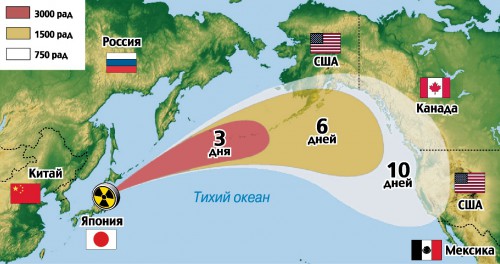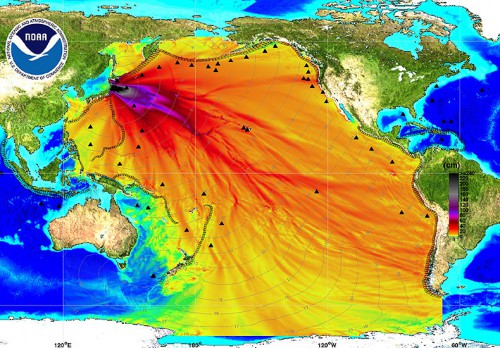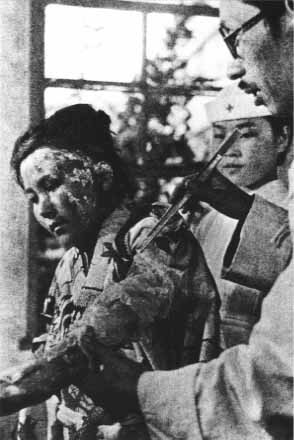lundi, 02 décembre 2013
L’Océan Pacifique est-il devenu radioactif ?

APRES FUKUSHIMA…
L’Océan Pacifique est-il devenu radioactif ?
Michel LhommeEx: http://metamag.fr

00:05 Publié dans Actualité, Ecologie, Géopolitique | Lien permanent | Commentaires (0) | Tags : politique internationale, japon, fukushima, nucléaire, écologie, pollution, océan pacifique, asie, affaires asiatiques |  |
|  del.icio.us |
del.icio.us |  |
|  Digg |
Digg | ![]() Facebook
Facebook
mercredi, 29 février 2012
Les ONG américaines se mêlent des projets nucléaires indiens
Il était temps que le premier ministre indien dénonce publiquement, et dans un média US de surcroît, la déstabilisation américaine en Inde. Ils finiront par pousser l'Inde à intégrer l'OCS comme avec l'Ukraine à intégrer l'Union eurasienne.
Les ONG américaines se mêlent des projets nucléaires indiens
|
|

|
© Collage: «Voix de la Russie»
|
|
«Manmohan Singh a déclaré dans une interview au magazine américain ce dont toute la presse indienne parlait depuis longtemps», explique le célèbre journaliste indien Vinay Shukla. Par exemple, le journal Times of India a rapporté que les organisations chrétiennes occidentales ont transféré à l'Inde 630 millions de roupies pour le financement de la campagne de protestation contre le développement de l'énergie nucléaire pacifique dans le pays. Par conséquent, la déclaration du premier ministre indien est vue très positivement. Les gens disent que le chef du gouvernement a enfin appelé les choses par leur nom, en exprimant fermement ce qu'il devait dire depuis très longtemps. En Occident, il y a effectivement certains cercles, en particulier en Scandinavie, qui ne veulent pas le développement économique de l'Inde, ayant à cet effet leurs propres projets».
En Inde, on se souvient bien que ces organisations, financées par les pays occidentaux, étaient à l’origine des protestations de masse contre la construction des usines de sidérurgie, des entreprises d'ingénierie, et des raffineries de pétrole. Dans l’interview au magazine Science, le premier ministre de l'Inde a également accusé les ONG étrangères de s'opposer au développement des biotechnologies de pointe dans le pays. «Les biotechnologies ont un potentiel énorme», explique-t-il. «Et nous avons besoin d’utiliser ces biotechnologies pour accroître la production alimentaire en Inde», a déclaré Manmohan Singh.
En ce qui concerne l'énergie nucléaire, les Etats-Unis ont signé au début de 2006 avec l'Inde un accord de coopération, en s'engageant à construire dans le pays des centrales nucléaires et fournir les technologies et l'équipement nécessaire à leur fonctionnement. Toutefois, jusqu'à présent, le travail en vertu de cet accord n'a toujours pas commencé. Mais l'activité des ONG basées aux Etats-Unis visant à entraver la coopération de l’Inde avec les autres pays dans le domaine de l'énergie nucléaire pacifique s’est intensifiée. Une tentative visant à perturber le lancement de la centrale nucléaire de Kudankulam, construite avec l'aide des technologies russes – ce n'est pas seulement une attaque contre un projet spécifique. Il s'agit d'une tentative de remettre en question l'ensemble du programme de la coopération russo-indienne dans la construction des centrales nucléaires, alors que la Russie et l’Inde comptent construire ensemble dans les années à venir en tout 16 blocs pour les centrales nucléaire indiennes.
00:05 Publié dans Actualité, Eurasisme, Géopolitique | Lien permanent | Commentaires (0) | Tags : politique internationale, inde, etats-unis, asie, affaires asiatiques, eurasie, eurasisme, énergie, énergie nucléaire, nucléaire |  |
|  del.icio.us |
del.icio.us |  |
|  Digg |
Digg | ![]() Facebook
Facebook
mardi, 25 janvier 2011
Saudi-Arabien will Atomsprengköpfe aus Pakistan abziehen
Saudi-Arabien will Atomsprengköpfe aus Pakistan abziehen
Udo Ulfkotte
Weil weder Israel noch die Vereinigten Staaten die Fortführung des iranischen Atomwaffenprogramms mit einem Militärschlag verhindert haben, will Saudi-Arabien nun seine Atomsprengköpfe aus Pakistan abziehen. Die Saudis haben auf dem südlich von Riad gelegenen geheimen unterirdischen Militärgelände von al-Sulaiyil alles für die Überführung ihrer Atomsprengköpfe vorbereiten lassen. Dort gibt es Tunnel für pakistanische Ghauri-II-Raketen, die eine Reichweite von 2.300 Kilometern haben. Saudi-Arabien ist seit vielen Jahren schon militärische Nuklearmacht, hatte die eigenen Waffen aber geschickt in Pakistan gelagert. So konnte man behaupten, nicht zu den Atomwaffenstaaten zu gehören.
Mehr: http://info.kopp-verlag.de/hintergruende/geostrategie/udo...

00:25 Publié dans Actualité, Géopolitique | Lien permanent | Commentaires (0) | Tags : arabie saoudite, armes nucléaires, armes atomiques, nucléaire, pakistan, moyen orient, monde arabe, monde arabo-musulman, politique internationale, géopolitique, actualité |  |
|  del.icio.us |
del.icio.us |  |
|  Digg |
Digg | ![]() Facebook
Facebook
jeudi, 27 mai 2010
EU muss im Streit um Irans Atomprogramm als ehrlicher Makler auftreten
EU muß im Streit um Irans Atomprogramm als ehrlicher Makler auftreten
Ziel der EU muß ein atomwaffenfreier Naher und Mittlerer Osten sein – Nicht nur der Iran, sondern auch Israel und Pakistan haben nuklearen Abrüstungsbedarf
Ex: http://andreas-moelzer.at/
Die Haltung im Streit um das iranische Atomprogramm sei ein außenpolitischer Glaubwürdigkeitstest für die Europäische Union, sagte heute der freiheitliche Delegationsleiter im Europäischen Parlament, Andreas Mölzer. „Brüssel ist gut beraten, als ehrlicher Makler aufzutreten und sich nicht den US-amerikanischen Scharfmachern anzuschließen. Wenn die EU nicht eine ausgewogene Haltung einnimmt, dann wird sie noch mehr als bisher als verlängerter Arm Washingtons wahrgenommen werden“, betonte Mölzer.
Zudem wies der freiheitliche EU-Mandatar darauf hin, daß die Schaffung eines atomwaffenfreien Nahen und Mittleren Ostens Ziel der europäischen Nahostpolitik sein müsse. „Wenn ein Staat unbedingt die Kernenergie zu friedlichen Zwecken will, dann soll das möglich sein. Allerdings muß gewährleistet sein, daß der betreffende Staat nicht im verborgenen an Nuklearwaffen arbeitet“, so Mölzer, der auch Mitglied des außenpolitischen Ausschusses des Europäischen Parlaments ist.
Dabei machte der freiheitliche Europa-Abgeordnete darauf aufmerksam, daß nicht nur der Iran wegen seines umstrittenen Atomprogramms in die Pflicht genommen werden müsse. „Israel, das nicht dem Atomwaffensperrvertrag beigetreten ist, hat ein Arsenal von schätzungsweise bis zu 200 Atomsprengköpfen. Somit hat Israel ungeachtet seines Rechts auf Selbstverteidigung und seines unbestreitbaren Existenzrechts erheblichen nuklearen Abrüstungsbedarf. Und von Pakistan, das bereits Atommacht ist, geht ein wesentliches größeres Gefährdungspotential aus als vom Iran. Wegen der politischen Instabilität Pakistans besteht nämlich die Gefahr, daß die pakistanischen Atomwaffen in die Hände islamischer Fundamentalisten geraten könnten“, schloß Mölzer.
00:30 Publié dans Actualité | Lien permanent | Commentaires (0) | Tags : politique internationale, programme nucléaire, nucléaire, nucléaire iranien, iran, europe, affaires européennes, union européenne, atome, énergie atomique, énergie nucléaire, moyen orient |  |
|  del.icio.us |
del.icio.us |  |
|  Digg |
Digg | ![]() Facebook
Facebook
vendredi, 26 février 2010
Cinco paises pediran a Washington que retire su arsenal atomico de Europa
Cinco países pedirán a Washington que retire su arsenal atómico de Europa
Alemania, Bélgica, Holanda, Luxemburgo y Noruega
Alemania, Bélgica, Holanda, Luxemburgo y Noruega van a pedir de forma conjunta a Estados Unidos la retirada de todas las armas nucleares que el Pentágono mantiene en suelo europeo. Así lo anunció este viernes el primer ministro belga, Ives Leterme.
Los cinco socios de la OTAN tienen previsto presentar esa iniciativa en el marco de la revisión del concepto estratégico de la Alianza Atlántica, explicó el mandatario en un breve comunicado: “Bélgica está a favor de un mundo sin armas nucleares y defiende esta postura en el seno de la OTAN en preparación de la conferencia de revisión del Tratado de no proliferación de mayo en Nueva York”.
Según Leterme, “los avances concretos sólo serán posibles a través de una concertación seria con los socios de la OTAN y teniendo en cuenta los progresos en las negociaciones en el campo del desarme”. El primer ministro aseguró que su Gobierno “quiere aprovechar la oportunidad brindada por el llamamiento del presidente Barack Obama a un mundo sin armas nucleares”, añadió.
El comunicado de Leterme es una respuesta al mensaje de dos antiguos primeros ministros belgas, Guy Verhofstadt y Jean-Luc Dehaene, y dos ex responsables de exteriores, Willy Claes y Louis Michel, publicado este viernes en la prensa. En él, los cuatro urgen a la retirada del arsenal atómico estadounidense en Europa y aseguran que éste “ha perdido toda su importancia militar”. “La Guerra Fría ha terminado. Es el momento de adaptar nuestra política nuclear a las nuevas circunstancias”, señalan los cuatro políticos.
Extraído de Radio Mundial.
00:25 Publié dans Actualité | Lien permanent | Commentaires (0) | Tags : actualité, politique internationale, politique, europe, affaires européennes, défense, armement, armes nucléaires, nucléaire, armes atomiques, etats-unis |  |
|  del.icio.us |
del.icio.us |  |
|  Digg |
Digg | ![]() Facebook
Facebook
lundi, 22 février 2010
Hiroshima and Nagasaki: Worst single terror attacks in history
Hiroshima and Nagasaki: Worst single terror attacks in history
Three days after Hiroshima's destruction, the US dropped an A-bomb on Nagasaki, resulting in the deaths of at least 70,000 people before the year was out.
Since 1945, tens of thousands more residents of the two cities have continued to suffer and die from radiation-induced cancers, birth defects and still births.
A tiny group of US rulers met secretly in Washington and callously ordered this indiscriminate annihilation of civilian populations. They gave no explicit warnings. They rejected all alternatives, preferring to inflict the most extreme human carnage possible. They ordered and had carried out the two worst single terror acts in human history.
Hiroshima and Nagasaki anniversaries are inevitably marked by countless mass media commentaries and US politicians' speeches that repeat the 64-year-old mantra that there was no other choice but to use A-bombs in order to avoid a bitter, prolonged invasion of Japan.
On July 21, 2005, the British New Scientist magazine undermined this chorus when it reported that two historians had uncovered further evidence revealing that “the US decision to drop atomic bombs on Hiroshima and Nagasaki ... was meant to kick-start the Cold War [against the Soviet Union, Washington's war-time ally] rather than end the Second World War”. Peter Kuznick, director of the Nuclear Studies Institute at the American University in Washington, stated that US President Harry Truman's decision to blast the cities “was not just a war crime, it was a crime against humanity”.
With Mark Selden, a historian from Cornell University in New York, Kuznick studied the diplomatic archives of the US, Japan and the USSR. They found that three days before Hiroshima, Truman agreed at a meeting that Japan was “looking for peace”. His senior generals and political advisers told him there was no need to use the A-bomb. But the bombs were dropped anyway. “Impressing Russia was more important than ending the war”, Selden told the New Scientist.
While the capitalist media immediately dubbed the historians' “theory” “controversial”, it accords with the testimony of many central US political and military players at the time, including General Dwight Eisenhower, who stated bluntly in a 1963 Newsweek interview that “the Japanese were ready to surrender and it wasn't necessary to hit them with that awful thing”.
Truman's chief of staff, Admiral William Leahy, stated in his memoirs that “the use of this barbarous weapon at Hiroshima and Nagasaki was of no material assistance in our war against Japan. The Japanese were already defeated and ready to surrender.”
At the time though, Washington cold-bloodedly decided to obliterate the lives of hundreds of thousands of men, women and children to show off the terrible power of its new super weapon and underline the US rulers' ruthless preparedness to use it.
These terrible acts were intended to warn the leaders of the Soviet Union that their cities would suffer the same fate if the USSR attempted to stand in the way of Washington's plans to create an “American Century” of US global domination. Nuclear scientist Leo Szilard recounted to his biographers how Truman's secretary of state, James Byrnes, told him before the Hiroshima attack that “Russia might be more manageable if impressed by American military might and that a demonstration of the bomb may impress Russia”.
Drunk from the success of its nuclear bloodletting in Japan, Washington planned and threatened the use of nuclear weapons on at least 20 occasions in the 1950s and 1960s, only being restrained when the USSR developed enough nuclear-armed rockets to usher in the era of “mutually assured destruction”, and the US rulers' fear that their use again of nuclear weapons would led to a massive anti-US political revolt by ordinary people around the world.
Washington's policy of nuclear terror remains intact. The US refuses to rule out the first use of nuclear weapons in a conflict. Its latest Nuclear Posture Review envisages the use of nuclear weapons against non-nuclear “rogue states” and it is developing a new generation of ‘battlefield” nuclear weapons.
Fear of the political backlash that would be caused in the US and around the globe by the use of nuclear weapons remains the main restraint upon the atomaniacs in Washington. On this 64rd anniversary year of history's worst acts of terror, the most effective thing that peace-loving people around the world can do to keep that fear alive in the minds of the US rulers is to recommit ourselves to defeating Washington's current “local” wars of terror in Afghanistan and Iraq.
This article was first published in Links - international journal of socialist renewal
00:10 Publié dans Histoire | Lien permanent | Commentaires (0) | Tags : japon, extreme orient, deuxième guerre mondiale, seconde guerre mondiale, armes atomiques, armes nucléaires, nucléaire |  |
|  del.icio.us |
del.icio.us |  |
|  Digg |
Digg | ![]() Facebook
Facebook




 August 6 and August 9 2009 marked the 64th anniversaries of the US atomic-bomb attacks on the Japanese cities of Hiroshima and Nagasaki. In Hiroshima, an estimated 80,000 people were killed in a split second. Some 13 square kilometres of the city were obliterated. By December, at least another 70,000 people had died from radiation and injuries.
August 6 and August 9 2009 marked the 64th anniversaries of the US atomic-bomb attacks on the Japanese cities of Hiroshima and Nagasaki. In Hiroshima, an estimated 80,000 people were killed in a split second. Some 13 square kilometres of the city were obliterated. By December, at least another 70,000 people had died from radiation and injuries.